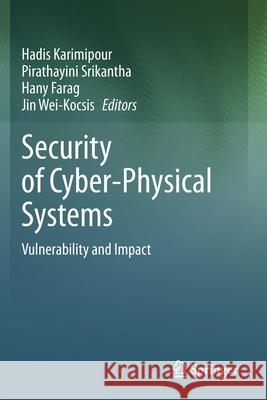Security of Cyber-Physical Systems: Vulnerability and Impact » książka



Security of Cyber-Physical Systems: Vulnerability and Impact
ISBN-13: 9783030455439 / Angielski / Miękka / 2021 / 323 str.
Security of Cyber-Physical Systems: Vulnerability and Impact
ISBN-13: 9783030455439 / Angielski / Miękka / 2021 / 323 str.
(netto: 690,08 VAT: 5%)
Najniższa cena z 30 dni: 655,41
ok. 16-18 dni roboczych.
Darmowa dostawa!
AI and Security of CyberP hysical Systems: Opportunities and Challenges.- Overview of Security for Smart Cyber-Physical Systems.- Design and Operation Framework for Industrial Control System Security Exercise.- Cascading Failure Attacks in the Power System.- The Risk of Botnets in Cyber Physical Systems.- Learning Based Anomaly Detection in Critical Cyber-Physical Systems.- Data-drivenAnomalyDetectioninModern PowerSystems.- AI-enabled Security Monitoring in Smart Cyber Physical Grids.- Application of Machine Learning in State Estimation of Smart Cyber-Physical Grid.- A Comparison Between Different Machine Learning Models for IoT Malware Detection.- A Bibliometric Analysis on the Application of Deep Learning in Cybersecurity.- Dynamical Analysis of Cyber‐Related Contingencies Initiated from Substations.- Distributed Attack and Mitigation Strategies for Active Power Distribution Networks.- Privacy-Preserving Homomorphic Masking for Smart Grid Data Analytics in the Cloud.- Attack-Resilient Energy Management Architecture for More Electric Aircrafts.- A Distributed Middleware Architecture for Attack - Resilient Communications in Smart Grids.
Hadis Karimipour is the director of Smart Grid Lab in the School of Engineering, University of Guelph, Ontario, Canada. She received a Ph.D. degree in Energy System from the Department of Electrical and Computer Engineering in the University of Alberta in Feb. 2016. Before joining the University of Guelph, she was a postdoctoral fellow in University of Calgary working on cybersecurity of the smart power grids. She is currently an Assistant Professor at the School of Engineering, Engineering Systems and Computing Group, at the University of Guelph, Ontario, Canada. Her research interests include large-scale power system state estimation, cyber-physical modeling, cyber-security of the smart grids, and parallel and distributed computing. She is a member of IEEE and IEEE Computer Society. She serves as the Chair of the IEEE Women in Engineering (WIE) and Chapter Chair of IEEE Information Theory in the Kitchener-Waterloo section.
This book stems from the CyberBRICS project, which is the first initiative to develop a comparative analysis of the digital policies developed by BRICS (Brazil, Russia, India, China and South Africa) countries. BRICS have been chosen as a focus not only because their digital policies are affecting more than 40% of the global population – i.e. roughly 3.2 billion individuals living in such countries – but also all the individuals and businesses willing to use technologies developed in the BRICS or trading digital goods and services with these countries. Given the complexity of digital policies in general and cybersecurity in particular – not to mention the specificities of BRICS countries – this work aims at laying the foundation on which further research on cybersecurity and digital policy in the BRICS can and will be developed.
1997-2026 DolnySlask.com Agencja Internetowa
KrainaKsiazek.PL - Księgarnia Internetowa









